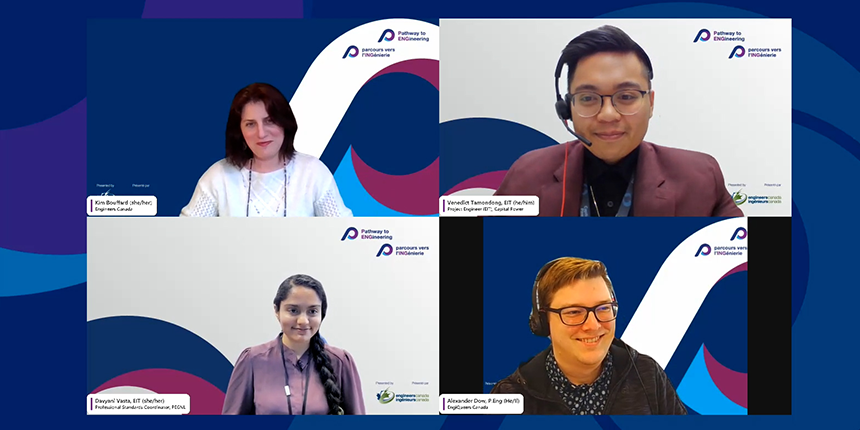

On March 27, Pathway to Engineering, the new platform to support recent engineering graduates, held the first of its Exchanges webinar series: You Have Your Engineering Degree... Now What?
Moderated by Kim Bouffard, Engineers Canada’s Manager of Belonging and Engagement, with an introduction by Jeanette Southwood, Engineers Canada’s Vice President, Corporate Affairs and Strategic Partnerships, the webinar featured three recent engineering graduates as panellists to discuss their academic and licensure journey, work experiences, life after graduation, and how they are using their engineering knowledge to contribute to today’s biggest challenges.
The panellists were: Alexander Dow, a recent P.Eng at David Schaeffer Engineering Ltd. and the co-Founder of EngiQueers Canada (EQ), a national nonprofit that advocates for 2SLGBTQI+ inclusion in the engineering profession; Davyani Vasta, an Engineer-in-Training (EIT), working as a Professional Standards Coordinator at Professional Engineers and Geoscientists Newfoundland and Labrador; and Venedict James G. Tamondong, a Project Engineer EIT, with the Construction Management group at Capital Power.
The three panellists engaged in a diverse and lively discussion that ranged from discussing the difficulties of transitioning from student life to professional work, how to advocate for personal career goals, and supports and programs they have used to set themselves up for success.
“When you're entering the professional world, I found that integration was incredibly tough. The transition really requires you to step outside of your comfort zone and be willing to interact with just different personalities, different perspectives, and different levels of experience,” Tamondong explained, discussing his transition from student to EIT.
Dow, as the only P.Eng. on the panel, expanded on the importance of learning the requirements for licensure and ensuring that the job experience a graduate pursued would meet the proper qualifications.
“Almost two thirds of folks who graduate from engineering degrees do not obtain licensure, and a third do not even go into the engineering profession. And we are in a period of time where we need engineers more than ever,” he said.
All three stressed the crucial role the employer could play in succeeding at becoming an engineer. Vasta shared how Competency-Based Assessment (CBA) requirements were a bit overwhelming at the beginning of her licensure journey.
“I reached out to my supervisor and we sat down and talked about potential solutions, like being more involved in other projects that will help me gain additional competencies,” Vasta said.
Tamondong added, “It's really important to take every opportunity that you can to learn about the application processes, to learn about the regulators, to get involved with your regulators. Take every opportunity that you can to become informed and to ask the questions.”
The discussion also included the importance of equity, diversity, and inclusion (EDI) in engineering, the importance of licensure, and general advice to the audience on finding their passion and reasons for achieving their engineering license.
“Personally, for me, it's the professional community that I value,” Vasta said, in reference to the importance of achieving her P.Eng.
“There's a level of ethical responsibility and leadership that's expected from a professional engineer,” Tamondong said. “It's really important that a professional engineer is responsible for their work and is responsible for maintaining the integrity of the ethics of the P.Eng.”.
Dow, as a recently licensed engineer, said, “it carries a lot of weight and respect, but it also carries a lot of responsibility. That's something I don't take lightly.”
All three are committed to their path and excited to continue their journey as engineers. The question and answer period allowed them to provide advice directly to their audience and expand on what being an engineer means to them.
“You're going to find your worth as an engineer. You get molded into a person that is able to handle colossal challenges and knows how to deconstruct them, to figure out what solutions work for you and in your work,” Tamadong said.
Email us with your ideas at connect@pathwaytoengineering.ca and connect with us on Instagram, LinkedIn, and Facebook. Tell us what topics you’d like us to dive into or which subjects you’d like to hear more about.


